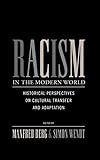Racism in the Modern World : Historical Perspectives on Cultural Transfer and Adaptation / ed. by Simon Wendt, Manfred Berg.
Material type: TextPublisher: New York ; Oxford : Berghahn Books, [2011]Copyright date: ©2011Description: 1 online resource (384 p.)Content type:
TextPublisher: New York ; Oxford : Berghahn Books, [2011]Copyright date: ©2011Description: 1 online resource (384 p.)Content type: - 9780857450760
- 9780857450777
- online - DeGruyter
| Item type | Current library | Call number | URL | Status | Notes | Barcode | |
|---|---|---|---|---|---|---|---|
 eBook
eBook
|
Biblioteca "Angelicum" Pont. Univ. S.Tommaso d'Aquino Nuvola online | online - DeGruyter (Browse shelf(Opens below)) | Online access | Not for loan (Accesso limitato) | Accesso per gli utenti autorizzati / Access for authorized users | (dgr)9780857450777 |
Frontmatter -- Contents -- Introduction. Racism in the Modern World: Historical Perspectives on Cultural Transfer and Adaptation -- 1. The Racialization of the Globe: Historical Perspectives -- 2. How Racism Arose in Europe and Why It Did Not in the Near East -- 3. Culture’s Shadow: “Race” and Postnational Belonging in the Twentieth Century -- 4. Racism and Genocide -- 5. Slavery and Racism in Nineteenth-Century Cuba -- 6. Toward a Transnational History of Racism: Wilhelm Marr and the Interrelationships between Colonial Racism and German Anti-Semitism -- 7. Transatlantic Anthropological Dialogue and “the Other”: Felix von Luschan’s Research in America, 1914–1915 -- 8. Transits of Race: Empire and Difference in Philippine-American Colonial History -- 9. Interrogating Caste and Race in South Asia -- 10. The Making of a “Ruling Race”: Defining and Defending Whiteness in Colonial India -- 11. Glocalizing “Race” in China: Concepts and Contingencies at the Turn of the Twentieth Century -- 12. Race without Supremacy: On Racism in the Political Discourse of Late Meiji Japan, 1890–1912 -- 13. Hendrik Verwoerd’s Long March to Apartheid: Nationalism and Racism in South Africa -- 14. The “Right Kind of White People”: Reproducing Whiteness in the United States and Australia, 1780s–1930s -- 15. Race and Indigeneity in Contemporary Australia -- Notes on Contributors -- Select Bibliography -- Index
restricted access online access with authorization star
http://purl.org/coar/access_right/c_16ec
Emphasizing the global nature of racism, this volume brings together historians from various regional specializations to explore this phenomenon from comparative and transnational perspectives. The essays shed light on how racial ideologies and practices developed, changed, and spread in Europe, Asia, the Near East, Australia, and Africa, focusing on processes of transfer, exchange, appropriation, and adaptation. To what extent, for example, were racial beliefs of Western origin? Did similar belief systems emerge in non-Western societies independently of Western influence? And how did these societies adopt and adapt Western racial beliefs once they were exposed to them? Up to this point, the few monographs or edited collections that exist only provide students of the history of racism with tentative answers to these questions. More importantly, the authors of these studies tend to ignore transnational processes of exchange and transfer. Yet, as this volume shows, these are crucial to an understanding of the diffusion of racial belief systems around the globe.
Mode of access: Internet via World Wide Web.
In English.
Description based on online resource; title from PDF title page (publisher's Web site, viewed 25. Jun 2024)


